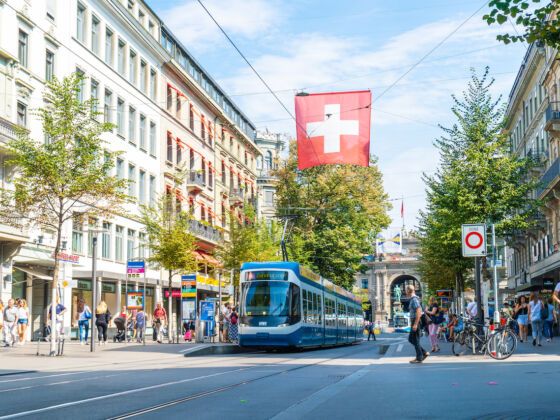IN THE POPULAR IMAGINATION Switzerland is a land of fancy cheese and chocolates, alpine idylls, and chalets galore. There are literally posts on question forums like Quora asking whether Switzerland should be considered a functional utopia. Offering up a little nature, a little culture, and a lot of comfort, it’s no wonder Switzerland’s a tourist darling, steadily siphoning off more American travelers every year.


Think Switzerland Is a Political Utopia? Here's One Thing You Might Not Know
Yet below Switzerland’s shiny veneer, there’s an undercurrent of xenophobia that might make it a less than comfortable destination for at least one group of people: observant Muslims. Swiss Islamophobia predates the anti-migrant panic sweeping Europe today, and runs far deeper. And you’re probably equally likely to feel it as a Swiss Muslim or a just visitor.
The wider world first realized that something was rotten in the cantons of the Alps in 2009 when a fairly wide margin of the nation decided to ban the construction of Islamic minarets by popular referendum, arguing that they clashed with architectural tradition of the region. During the campaign on the referendum, the anti-immigrant conservative Swiss People’s Party (SVP) put up posters featuring a sinister woman in a black burqa standing before an image of Switzerland covered in black minarets (this was part of a series of troubling ads by the party featuring black representations of “outsiders” being soundly rejected by the Swiss people).
That same party swept national elections last fall, taking a plurality of the vote and stealing seats from more progressive parties, all while running on an anti-immigrant platform. This year, a local branch of the party in the canton of Valais gathered enough signatures to force a law or referendum on a hijab ban. Another canton, Ticino, already approved a burqa ban in 2013 which will likely soon go into effect, threatening fines of up to $9,835 for anyone (including visitors) caught wearing one. Similar bans have been floated in at least three other cantons as well.
These bans aren’t just isolated and abstract statements of Swiss values. Muslims in the nation also talk about the visceral, felt experience of walking around wearing a hijab or some other visible symbol of their faith (Non-Muslim Swiss seem to regard the hijab as an absolute symbol of women’s subjugation, rather than the choice it is for many). Their stories encompass everything from constant sideways glances to rejection by mentorship programs or job applications based on preconceptions about what it means to wear a hijab or to be observant.
To be fair to the Swiss, voter turnout for some of these rulings was miserable, press coverage of the Islamophobic campaigns was negative, and courts took a dim view of the SVP’s campaign posters as well as of some headgear bans, so they’re not necessarily representative of the nation. But they slipped through — and the fact that people will mobilize for them while others stay at home or argue back from afar just shows how deep this xenophobioa runs for some.
Some Swiss may argue that they don’t actually have a problem with Islam. They say what they take issue with is the threat of any different community moving in, failing to integrate and, in the process, altering their culture and changing what it means to be Swiss (a situation they believe they have seen play out in many neighboring nations to ill effect).
It’s the same logic behind more general immigration quotas enacted in the nation in recent years. But it’s also not really based on the Swiss experience of Islam; Switzerland’s five percent Muslim population is mostly made up of migrants or refugees from the 1990s Balkan conflicts who rarely ever wear the hijab or any other outward religious symbols. And as for the minaret ban, the nation had only four minarets (which weren’t that visible) amongst their 150 or so mosques and prayer spaces at the time of the vote. In recent history, Switzerland’s also not been a huge migrant destination — even now it’s hardly the hardest hit nation in Europe’s refugee crisis.
The impulse to preserve Switzerland’s national identity and avoid the pitfalls of other European nations is understandable. But it’s also emblematic of a deep and palpable cultural paranoia, given the realities they’re reacting against. In trying to preserve “Swissness,” Switzerland’s actually just increasing the chance that Swiss identity will become synonymous with a genteel and self-soothing form of bigotry. And ironically, by trying to avoid problems, they may be creating more: by marginalizing those who don’t fit their image of Swiss society, they’re creating just the right conditions for social tension within the nation.